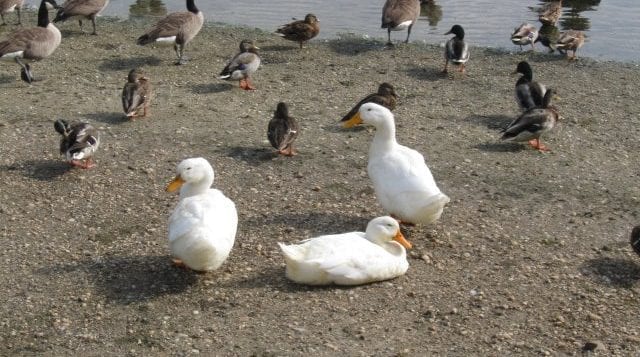Suffolk County’s Society for the Prevention of Cruelty to Animals is offering a $2,000 reward for information leading to those individuals who might be responsible for decapitating six birds found in Smithtown and Great River.
The Town of Smithtown’s Public Safety Department received an anonymous phone call Feb. 4 reporting three dead birds were found near the Maple Avenue and 4th Avenue entrance to Millers Pond County Park, according to town spokeswoman Nicole Garguilo. The public safety officers then immediately notified the Suffolk SCPA.
Roy Gross, chief of the nonprofit animal advocacy group, said his volunteers working in cooperation with Smithtown park rangers and Suffolk County Police Department found the bodies of two chickens and a blue jay that had been beheaded lying next to a bloodied cardboard box.
“People do these animal sacrifices, and it’s absolutely illegal. They will say they are allowed to do it because it’s a religious right. It is not.”
— Roy Gross
The following day, Feb. 5, the SCPA received a report of three decapitated birds, two chickens and a dove, left alongside Wheeler Road in Great River. Gross said additional items left at the site raised questions as to whether the animals’ deaths were ritualistic in nature.
“We’ve had numerous cases over the years,” he said. “It has all the indications of a religious animal sacrifice.”
The SPCA contacted Marcos Quinones, a retired New York police detective of 36 years and renowned occult specialist, on these two cases. Quinones said he has worked with law enforcement officials at federal, state and local levels on various causes related to occult matters.
“Santeria is a nature-based religion, and it varies based on what god or goddess you worship, each has an element of nature they are thought to control,” he said. “If you needed something from them, you would do a ritual.”
Quinones said based on the location of the six birds’ bodies and items left with them, he believes the birds were killed elsewhere and brought to the pond as a religious offering for Oshun, goddess of the rivers and lakes.
“Santeria is basically a good, nature-based religion, but sometimes people take something good and misuse it,” the occult expert said. “You have to ask yourself what’s the purpose of this ritual?”
Under New York State law, to kill an animal without any intention to consume it is illegal, according to Gross.
“People do these animal sacrifices, and it’s absolutely illegal,” he said. “They will say they are allowed to do it because it’s a religious right. It is not.”
In February 2018, the Suffolk SPCA found the bodies of two hens frozen in the ice at Millers Pond. Gross said the chickens’ heads were found a short distance away, but it was originally thought that other animals may have ripped it apart from the body as potential food.
“We canvassed the area to see if anyone had chickens that were lost,” the chief said. “We did a thorough investigation but couldn’t get any information on it.”
“If there’s an arrest and conviction, that’s a check I’m happy to write.”
— Roy Gross
Gross said twice the SPCA has found a cow’s tongue nailed to a tree across from Bayard Cutting Arboretum in Great River. Upon further investigation, SPCA volunteers discovered candle wax, pins and nine slips of paper bearing individual names had been inserted inside the cow’s tongue, according to Gross. Another time the cow’s tongue was attached by a fishing lure and left out with a bowl of livestock feed as an offering.
“Imagine if a child had come along and grabbed it or seen something like that,” Gross said. “It’s bad enough for an adult, walking along and seeing a tongue hanging from a tree or a beheaded animal. It’s barbaric and should not exist in this day and age.”
If an arrest is made, Gross said the individual will face misdemeanor charges of animal cruelty to wildlife or farm life, which carries a maximum penalty of up to a year in jail and a $1,000 fine for each offense.
The SPCA is asking anyone who may have information related to the recent discoveries in Smithtown and Great River to contact the nonprofit organization at 631-382-7722. All calls are confidential.
“If there’s an arrest and conviction, that’s a check I’m happy to write,” Gross said.







